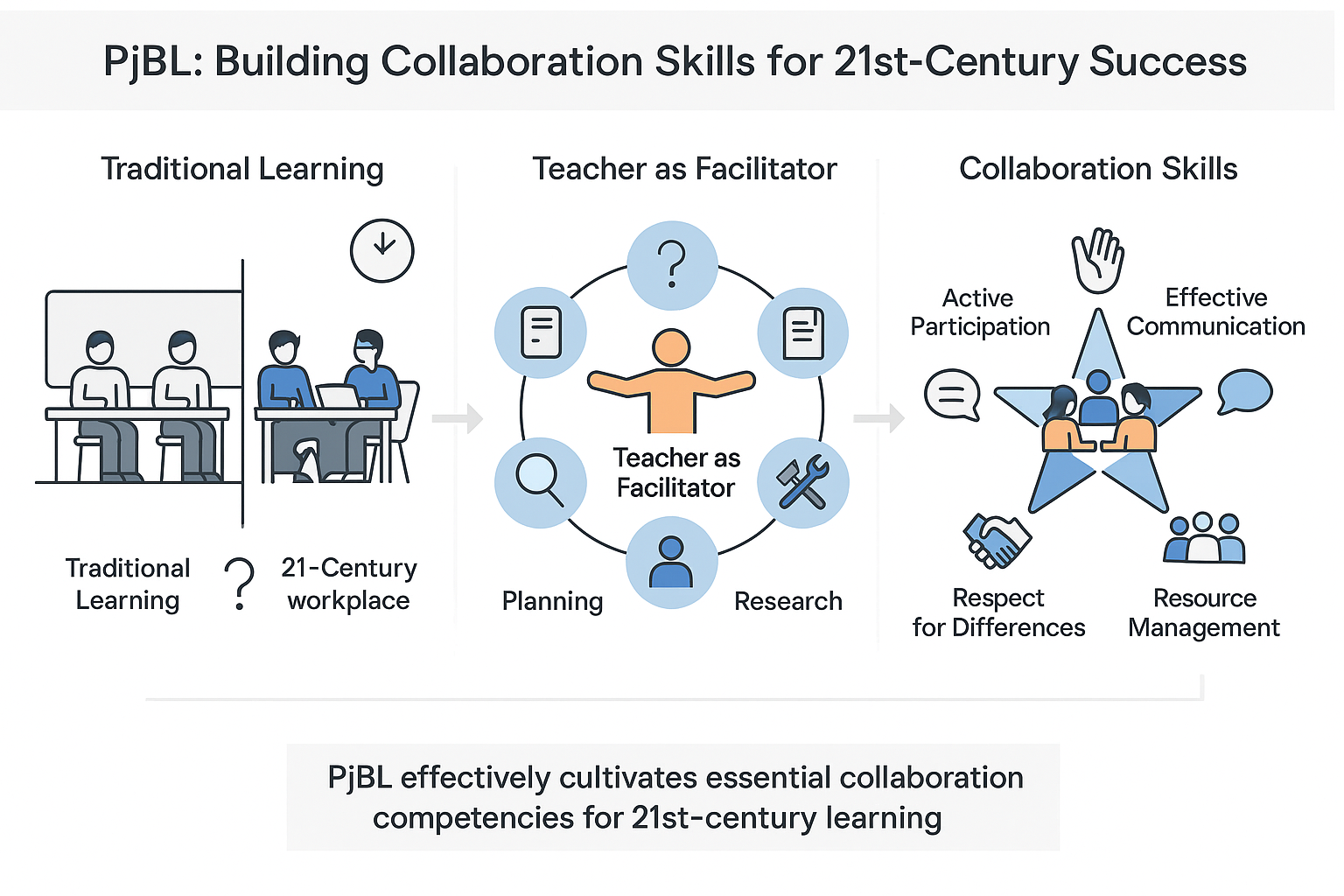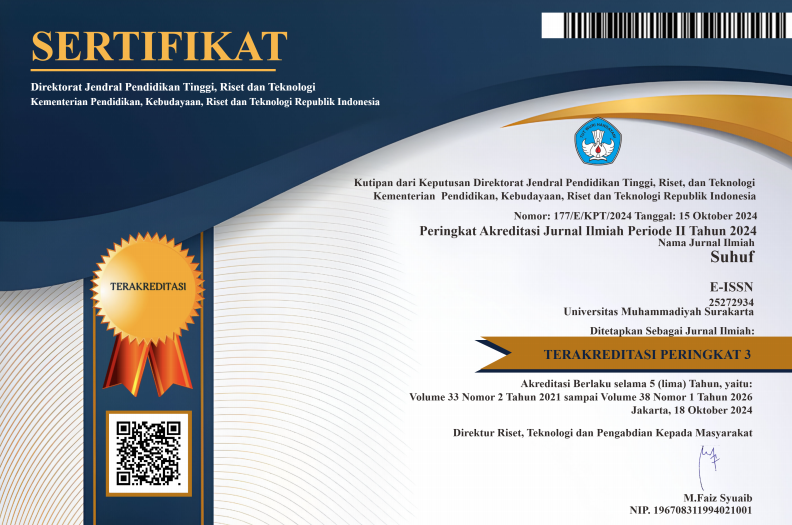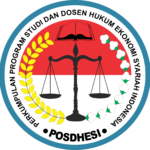The Implementation of Project-Based Learning to Enhance Collaborative Skills in Senior High School
DOI:
https://doi.org/10.23917/suhuf.v37i1.10189Keywords:
Education in Indonesia, Learning model implementation, Resource management, Effective communicationAbstract
Collaboration skills are an important competency in facing the challenges of the 21st-century world. Therefore, collaboration skills need to be developed since students are in school. The Project-Based Learning (PJBL) learning model, whose learning center is focused on students, is said to be able to improve students' collaboration skills. This study aims to describe the implementation of the PjBL model in Senior High School (SMA) and examine its contribution to improving students' collaboration skills. This study uses a literature review method. Analysis was carried out on the implementation of PjBL and the indicators of collaboration skills developed. The data was taken from the Google Scholar and Publish or Perish databases, with the article criteria being an Indonesian article about implementing the Project-Based Learning learning model in high school students with a publication period of 2015 to 2025. 18 articles met these criteria. The results of the study show that to obtain effective implementation of PjBL, teachers must know the proper stages of implementation of PjBL and be able to carry out their role as facilitators well. PjBL has improved students' collaboration skills in five key dimensions: active participation, effective communication, group responsibility, respect for differences, and resource management. These findings reinforce the importance of implementing PjBL as an effective approach in shaping students' collaboration skills in the 21st-century learning era.
Downloads
References
[1] A. Devia, “Pengaruh Model Project Based Learning (Pjbl) Terhadap Keterampilan Kolaborasi Mata Pelajaran Ips Peserta Didik Kelas V Sd Negeri 4 Kuripan Kota Agung Kabupaten Tanggamus [The Influence of the Project-Based Learning (PjBL) Model on Collaboration Skills in .” UIN RADEN INTAN LAMPUNG, p. (in Indonesia), 2022. [Online]. Available: https://repository.radenintan.ac.id/id/eprint/22406
[2] Y. Yokhebed, “Profil kompetensi abad 21: komunikasi, kreatif, kolaborasi, berpikir kritis pada calon guru biologi [21st Century Competency Profile: Communication, Creativity, Collaboration, and Critical Thinking in Prospective Biology Teachers],” in Proceeding Biology Education Conference: Biology, Science, Enviromental, and Learning, 2019, pp. 1–18, (in Indonesia). [Online]. Available: https://jurnal.uns.ac.id/prosbi/article/view/38406
[3] S. Rahayu, E. E. Pramiarsih, and B. A. Sritumini, “Pengaruh model project based learning terhadap peningkatan kemampuan kolaborasi siswa dalam mata pelajaran ekonomi bisnis [The Influence of the Project-Based Learning Model on Improving Student Collaboration Skills in Business Economics Subjects],” J. Pendidik. Dan Pembelajaran Ekon. Akunt., vol. 5, no. 2, pp. 132–143, (in Indonesia), 2019, [Online]. Available: https://jurnal.fkip.unla.ac.id/index.php/jp2ea/article/view/330
[4] N. Afif and A. Fauzi, “Hubungan kecerdasan emosional dan perilaku sosial dengan keterampilan kolaborasi dalam pembelajaran [The Relationship Between Emotional Intelligence and Social Behavior with Collaboration Skills in Learning],” Paradigma, vol. 19, no. 1, pp. 40–54, (in Indonesia), 2022, doi: https://doi.org/10.33558/paradigma.v19i1.3250.
[5] P. OECD, Results (Volume V): Collaborative Problem Solving, 2017. Paris: OECD Publishing, 2015. doi: http://dx. doi. org/10.1787/9789264285521-en.
[6] E. Shany, M. G. Miranti, and L. T. Pangesthi, “Analisis Kemampuan Komunikasi dan Kolaborasi Siswa Dalam Pembelajaran Post Pandemic COVID-19 [Analysis of Students’ Communication and Collaboration Skills in Post-Pandemic COVID-19 Learning],” Pubmedia J. Penelit. Tindakan Kelas Indones., vol. 1, no. 4, pp. 13, (in Indonesia), 2024, doi: https://doi.org/10.47134/ptk.v1i4.868.
[7] P. M. K. R. Pendidikan, “Tahun 2022 tentang Standar Proses pada Pendidikan Anak Usia Dini [The 2022 Standard Process for Early Childhood Education],” Jenjang Pendidikan Dasar, dan Jenjang Pendidikan Menengah. p. (in Indonesia), 16AD. [Online]. Available: https://peraturan.bpk.go.id/Details/224238/permendikbudriset-no-16-tahun-2022
[8] A. Puspitasari and Q. Z. A. Murtadho, “Spinning Wheels of Knowledge: Elevating Arabic Language Learning Through Innovative Teaching Methods,” Suhuf Int. J. Islam. Stud., vol. 35, no. 2, pp. 50–58, 2023, doi: https://doi.org/10.23917/suhuf.v35i2.23074.
[9] N. F. Rohmah and Z. Abidin, “Model Program Unggulan Di Madrasah Aliyah Darul Huda Mayak Tonatan Ponorogo [Excellence Program at Madrasah Aliyah Darul Huda Mayak Tonatan Ponorogo],” Suhuf Int. J. Islam. Stud., vol. 33, no. 2, pp. 169–180, (in Indonesia), 2021, doi: https://doi.org/10.23917/suhuf.v33i2.16584.
[10] E. Syahputra, “Pembelajaran abad 21 dan penerapannya di Indonesia [21st Century Learning and Its Implementation in Indonesia],” J. Inf. Syst. Educ. Dev., vol. 2, no. 4, pp. 10–13, (in Indonesia), 2024, doi: https://doi.org/10.62386/jised.v2i4.104.
[11] M. F. J. Syah and Suranto, Strategi Pembelajaran Teori dan Praktik di Abad 21. Surakarta: Muhammadiyah University Press, 2022.
[12] M. N. Huda, M. Duwila, and R. Rohmadi, “Menantang Disintegrasi Moral di Era Revolusi Industri 4.0: Peran Revolusioner Pondok Pesantren [Challenging Moral Disintegration in the Era of the Industrial Revolution 4.0: The Revolutionary Role of Islamic Boarding Schools (Pondok Pesantren)],” J. Islam. Educ., vol. 9, no. 1, pp. 1–13, (in Indonesia), 2023, doi: https://doi.org/10.18860/jie.v9i1.22805.
[13] S. A. Mappasere and N. Suyuti, “Pendekatan Kualitatif,” in Metode Penelitian Sosial, KulonProgo: Penerbit Gawe Buku, 2019, pp. 33–53. [Online]. Available: https://www.researchgate.net/profile/Ismail-Wekke/publication/344211045_Metode_Penelitian_Sosial/links/5f5c132ea6fdcc11640bd740/Metode-Penelitian-Sosial.pdf#page=42
[14] Sugiyono, Metode Penelitian Pendidikan Pendekatan Kuantitatif, Kualitatif, dan R&D. Jakarta: Alfabeta, 2013.
[15] M. Sari and A. Asmendri, “Penelitian kepustakaan (library research) dalam penelitian pendidikan IPA [Library Research in Science Education Research],” Nat. Sci., vol. 6, no. 1, pp. 41–53, (in Indonesia), 2020, doi: https://doi.org/10.15548/nsc.v6i1.1555.
[16] F. Mulianingsih, K. Anwar, F. A. Shintasiwi, and A. J. Rahma, “Artificial Intellegence dengan Pembentukan Nilai dan Karakter di Bidang Pendidikan [Artificial Intelligence with the Formation of Values and Character in the Field of Education],” Ijtimaiya J. Soc. Sci. Teach., vol. 4, no. 2, pp. 148–154, (in Indonesia), 2020, doi: http://dx.doi.org/10.21043/ji.v4i2.8625.
[17] N. Mona, R. C. Rachmawati, and M. Anshor, “Penerapan Model Project Based Learning untuk Meningkatkan Keterampilan Kolaborasi dan Keterampilan Kreativitas Peserta Didik,” J. Pendidik. Guru Prof., vol. 1, no. 2, pp. 150–167, 2023, doi: 10.26877/jpgp.v1i2.230.
[18] D. Septianingsih, M. Z. Burhanudin, M. Fawzia, H. Irawati, and P. A. Wahyuni, “Implementasi Metode Pembelajaran Project Based Learning Berbasis Teknologi Canva Untuk Meningkatkan Kreativitas Peserta Didik di SMA N 1 Tambun Selatan [Implementation of the Project-Based Learning Method Using Canva Technology to Enhance Student Creativi,” SSRN, pp. 1–30, 2024, doi: https://dx.doi.org/10.2139/ssrn.4837650.
[19] N. Adiniyah and A. P. Utomo, “Implementasi Model Project Based Learning Berdiferensiasi Berdasarkan Kesiapan Belajar Peserta Didik Pada Materi Sistem Imun Kelas XI SMA [Implementation of the Differentiated Project-Based Learning Model Based on Students’ Learning Readiness in the Immun,” J. Teknol. Pendidik., vol. 1, no. 1, pp. 1–9, (in Indonesia), 2023.
[20] A. A. Purba, A. Y. S. Sitanggang, J. Panjaitan, and R. Tampubolon, “Penerapan Project Based Learning (Pjbl) Berbantuan Media Pembelajaran Untuk Meningkatkan Keterampilan Berpikir Kritis Siswa Kelas X Sma Swasta Pamasta Tanjung Morawa 2022 [Implementation of the Differentiated Project-Based Learning Model Based on Students,” J. Penelit. Fis., vol. 6, no. 1, pp. 1–14, 2023, doi: http://dx.doi.org/10.46930/jurnalpenelitianfisikawan.v6i1.2691.
[21] I. Ulva et al., “Implementasi Model Pembelajaran Project Based Learning (PjBL) pada Teks Hikayat dan Cerpen dengan Proyek Video di Kelas X SMA Negeri 1 Kota Mojokerto [Implementation of the Project-Based Learning (PjBL) Model on Hikayat and Short Story Texts through a Vid,” Sinar Dunia J. Ris. Sos. Hum. dan Ilmu Pendidik., vol. 3, no. 4, pp. 31–39, (in Indonesia), 2024, doi: https://doi.org/10.58192/sidu.v3i4.2656.
[22] R. Shihah, J. Siburian, and A. Sadikin, “Pengaruh Model Project Based Learning (PjBL) Terhadap Kemampuan Berpikir Kreatif dan Keterampilan Kolaborasi Siswa SMA pada Materi Keanekaragaman Hayati [The Effect of the Project-Based Learning (PjBL) Model on Creative Thinking Skills and Collaboration S,” Syntax Lit., vol. 8, no. 4, p. (in Indonesia), 2025, [Online]. Available: https://repository.unja.ac.id/76139/
[23] I. Setiawan, “Implementasi Pembelajaran Pendidikan Agama Islam melalui Metode Project-Based Learning di SMA Islam Al-Azhar [Implementation of Islamic Religious Education Learning Through the Project-Based Learning Method at Al-Azhar Islamic Senior High School],” An Najah (Jurnal Pendidik. Islam dan Sos. Keagamaan), vol. 3, no. 2, pp. 58–62, (in Indonesia), 2024, [Online]. Available: https://journal.nabest.id/index.php/annajah/article/view/390
[24] D. Mustafa, A. Adnan, and A. Kuddus, “Implementasi Model Pembelajaran Project Based Learning dalam Peningkatan Hasil Belajar Peserta Didik Kelas XI Materi Sistem Koordinasi di SMA Negeri 6 Makassar [The Implementation of the Project-Based Learning Model in Improving Learning Outcomes of Grade,” J. Pemikir. DAN Pengemb. PEMBELAJARAN, vol. 5, no. 2, pp. 458–463, (in Indonesia), 2023.
[25] N. S. Azhari, H. H. Simangunsong, I. A. A. Hrp, N. A. Afdilani, and I. F. Tanjung, “Penerapan Project Based Learning (PjBL) untuk Meningkatkan Hasil Belajar Siswa Kelas XII IPA 1 SMA N 2 Percut Sei Tuan pada Materi Gen [The Application of Project-Based Learning (PjBL) to Improve Learning Outcomes of Grade XII IPA 1 Students at SMA N 2 Pe,” J. PTK Dan Pendidik., vol. 8, no. 2, pp. 1–7, (in Indonesia), 2022, doi: https://doi.org/10.18592/ptk.v8i2.6806.
[26] Y. Riskayanti, “Peningkatan Keterampilan Berpikir Kritis, Komunikasi, Kolaborasi Dan Kreativitas Melalui Model Pembelajaran Project Based Learning Di Sma Negeri 1 Seteluk,” Second. J. Inov. Pendidik. Menengah, vol. 1, no. 2, pp. 19–26, (in Indonesia), 2021, doi: https://doi.org/10.51878/secondary.v1i2.117.
[27] N. L. Inayati and A. Safina, “Manajemen Pembelajaran Tahfidzul Qur’an Santriwati Pondok Pesantren Islam Al-Mukmin Sukoharjo [Management of Tahfidzul Qur’an Learning for Female Students at Al-Mukmin Islamic Boarding School, Sukoharjo],” Suhuf Int. J. Islam. Stud., vol. 31, no. 1, pp. 13–39, (in Indonesia), 2019, doi: https://doi.org/10.23917/suhuf.v31i1.9003.
[28] L. Indarwati, A. F. Arsal, and Rosmawati, “Penerapan Model Project Based Learning(PjBL)pada Materi Psikotropika Terhadap Peningkatan Keterampilan Kolaborasi Siswa XI MIPA 3 SMA Negeri 1 Takalar,” J. Pemikir. dan Pengemb. Pembelajaran, vol. 5, no. 2, pp. 357–364, 2023.
[29] F. Indillah and M. Bakhruddin, “Implementasi Project Based Learning Festival Tengah Semester dalam Menumbuhkan Kemampuan Sikap Kolaborasi Siswa pada Mata Pelajaran Al-Islam di SMA Muhammadiyah 10 Surabaya [Implementation of the Project-Based Learning Middle Semester Festival in Fosterin,” Risalah, J. Pendidik. dan Stud. Islam, vol. 9, no. 2, pp. 775–781, (in Indonesia), 2023, doi: https://doi.org/10.31943/jurnal_risalah.v9i2.480.
[30] U. Hayati, K. Saifuddin, and K. Arafah, “Meningkatkan Keterampilan Kolaborasi melalui Model Pembelajaran Project Based Learning dengan Alur Merdeka di SMA Negeri 1 Soppeng,” J. Pemikir. Dan …, vol. 5, no. 2, pp. 555–559, 2023.
[31] M. T. R. Ahwan, S. Basuki, and Mashud, “Meningkatkan Keterampilan Kolaborasi Siswa melalui Aktivitas Kebugaran Jasmani Menggunakan Model Project Based Learning ( PjBL ) SMA Negeri 3 Banjarbaru,” J. Pendidik. Kesehat. Rekreasi, vol. 9, no. 1, pp. 106–119, 2023, doi: 10.5281/zenodo.7592832.
[32] F. U. Nasution, N. Amanda, P. I. Galingging, and W. Arwita, “Studi Literatur: Permasalahan Kolaborasi Siswa dengan Penerapan Model Project Based Learning (PjBL) di SMA Negeri 14 Medan [Literature Study: Issues of Student Collaboration with the Implementation of the Project-Based Learning (PjBL) Model at SMA Negeri ,” Innov. J. Soc. Sci. Res., vol. 4, no. 3, pp. 9800–9807, (in Indonesia), 2024, [Online]. Available: http://j-innovative.org/index.php/Innovative/article/view/11507

Downloads
Submitted
Accepted
Published
How to Cite
Issue
Section
License
Copyright (c) 2025 Laila Nur Khasanah, Muh. Nur Rochim Maksum, Nurul Nashuha Binti Zahid

This work is licensed under a Creative Commons Attribution 4.0 International License.


















